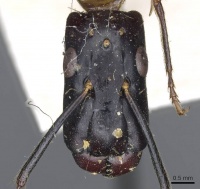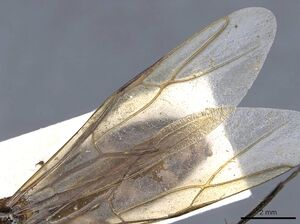Camponotus postangulatus
| Camponotus postangulatus | |
|---|---|

| |
| Scientific classification | |
| Kingdom: | Animalia |
| Phylum: | Arthropoda |
| Class: | Insecta |
| Order: | Hymenoptera |
| Family: | Formicidae |
| Subfamily: | Formicinae |
| Tribe: | Camponotini |
| Genus: | Camponotus |
| Species: | C. postangulatus |
| Binomial name | |
| Camponotus postangulatus Emery, 1911 | |
Known only from the queen holotype, nothing is known about the biology of Camponotus postangulatus.
Identification
A member of the subgenus Myrmostenus.
Mackay (1997) - This species is very similar to Camponotus longipilis but can be separated easily as the occipital angles are well differentiated, and there are no erect hairs on the ventral surface of the head. The surface of the clypeus is strongly convex with a well differentiated clypeal carina.
This species is closely related to C. longipilis, but is distinct enough to be regarded as a valid species. In addition, the type locality for both species is the same. The characters in the key and in the diagnoses of the two species should be sufficient to separate the two species.
Keys including this Species
Distribution
Only known from the Peru type locality.
Distribution based on Regional Taxon Lists
Neotropical Region: Peru (type locality).
Distribution based on AntMaps
Distribution based on AntWeb specimens
Check data from AntWeb
Countries Occupied
| Number of countries occupied by this species based on AntWiki Regional Taxon Lists. In general, fewer countries occupied indicates a narrower range, while more countries indicates a more widespread species. |

|
Estimated Abundance
| Relative abundance based on number of AntMaps records per species (this species within the purple bar). Fewer records (to the left) indicates a less abundant/encountered species while more records (to the right) indicates more abundant/encountered species. |

|
Biology
Castes
Images from AntWeb

| |
| Holotype of Camponotus postangulatus. Queen (alate/dealate). Specimen code casent0905509. Photographer Z. Lieberman, uploaded by California Academy of Sciences. | Owned by MSNG, Genoa, Italy. |
Nomenclature
The following information is derived from Barry Bolton's Online Catalogue of the Ants of the World.
- postangulatus. Camponotus longipilis var. postangulata Emery, 1911a: 225 (q.) PERU.
- Type-material: holotype queen.
- Type-locality: Peru: Pachitea (no collector’s name) (from Staudinger & Bang-Haas).
- Type-depository: MSNG.
- Combination in C. (Myrmostenus): Emery, 1925b: 161.
- Subspecies of longipilis: Emery, 1925b: 161; Kempf, 1972a: 59; Bolton, 1995b: 118.
- Status as species: Mackay, 1997: 202 (redescription); Bezděčková, et al. 2015: 113.
- Distribution: Peru.
Unless otherwise noted the text for the remainder of this section is reported from the publication that includes the original description.
Description
Queen
Mackay (1997) - HL 3.62, HW 2.00, SL 2.84, EL 0.76, clypeal length 1.30, clypeal width 0.96. Indices: SI 78, CI 55, clypeal index 74.
Mandible with 6 poorly defined teeth; clypeus strongly convex with well developed carina; clypeal border weakly concave; scape extending past posterior border of head; head somewhat flattened when viewed in profile, shape identical to that of Camponotus longipilis, except for presence of occipital angles; vertex concave, with well developed occipital angles; maxillary and labial palps as in C. longipilis; mesosoma and petiole as in C. longipilis. Hairs; decumbent pubescence and sculpture as in C. longipilis.
Type Material
Mackay (1997) - Holotype queen, Pachitea, Peru, Stdg; longipilis var. postangulata Emery (Museo Civico di Storia Naturale, Genoa) [seen].
References
- Emery, C. 1911d. Fragments myrmécologiques. Ann. Soc. Entomol. Belg. 55: 213-225 (page 225, queen described)
- Emery, C. 1925d. Hymenoptera. Fam. Formicidae. Subfam. Formicinae. Genera Insectorum 183: 1-302 (page 161, Combination in C. (Myrmostenus))
- Mackay, W.P. 1997. A revision of the Neotropical ants of the genus Camponotus, subgenus Myrmostenus. Proceedings of the Entomological Society of Washington. 99:194-203.
References based on Global Ant Biodiversity Informatics
- Bezdeckova K., P. Bedecka, and I. Machar. 2015. A checklist of the ants (Hymenoptera: Formicidae) of Peru. Zootaxa 4020 (1): 101–133.
- Emery C. 1911. Fragments myrmécologiques. Annales de la Société Entomologique de Belgique 55: 213-225.

